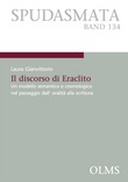Explore

Im allgemeinen Verständnis begründen die Vorsokratiker das philosophische Fachwissen und die philosophische Fachsprache. Diese Annahme wird in der vorliegendenArbeit mittels einer semantischenAnalyse revidiert: die Sprache derVorsokratiker meidet nicht, sondern zielt geradezu auf mehrdeutige und redundante Ausdrucksweisen. Hier ist der nicht-terminologische Gebrauch von logos bei Heraklit besonders aufschlussreich. In der Bedeutung dieses Lexems, die an den biszur Zeit des Ephesiers belegten Verwendungskontexten untersucht wird, zeigt sich die noch wirkende Kontinuität mit der legein- Grundbedeutung „sammeln“:die „Rede“ besteht nämlich aus einerSammlung einzelner epea bzw. onomata. Aufgrund ihrer synthetischen Struktur istsie geeignet, eine heuristische Funktion für das menschliche Verstehen der latenten Einheit scheinbar loser Erscheinungen zuerfüllen. Sowohl formal, in der Art, wiedas Lexem semantisch aufgeladen wird, als auch inhaltlich, in der spezifi sch herakliteischen Interdependenz zwischen Realität und Sprache, lassen sich in dem logos desHeraklit Charakteristika erkennen, die auf den Übergang von der Mündlichkeit zur Schriftlichkeit zurückgeführt werden können.Secondo la communis opinio, i Presocratici segnano l’inizio della filosofi a come disciplina e del relativo linguaggio specialistico. Tali presupposti vengono qui messi in discussione in base ad un’analisi semantica del linguaggio presocratico:piuttosto che ridurre, esso potenziaambiguità e ridondanza sfruttandolecome risorse del senso. L’esame siconcentra sull’uso non terminologicodi logos in Eraclito. Il signifi cato dellessema, stabilito in base ai contestid’uso attestati fi no all’epoca dell’Efesio ed affrancato dalla successiva Wirkungsgeschichte,è ancora contraddistintodall’idea del ‘raccogliere insieme’ (legein): il ‘discorso’, infatti, consiste nella sintesi di singoli epea (detti) ed onomata (nomi). Mostrando il farsi uno dei molti, il logos assume dunque una funzione euristica per la comprensione dell’unità di fenomeni apparentemente irrelati o contraddittori. Sia a livello formale, neimodi della “ri-semantizzazione” della parola- chiave, sia a livello contenutistico, nella specifi ca interdipendenza scorta tra linguaggio e mondo, si riconoscono nel logos di Eraclito caratteristiche salienti del compromesso tra oralità e scrittura.Der Erwerb des Buches ist ,möglich: www.olms.de
This book is included in DOAB.
Why read this book? Have your say.
You must be logged in to comment.
